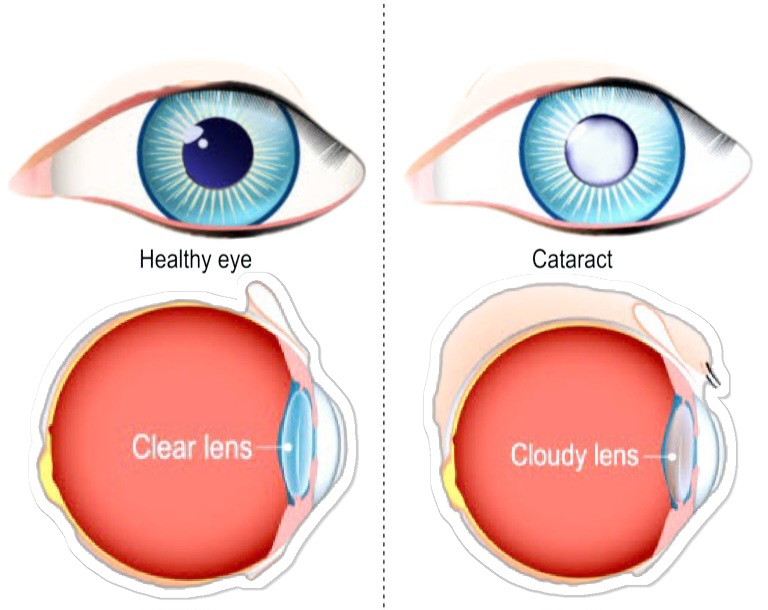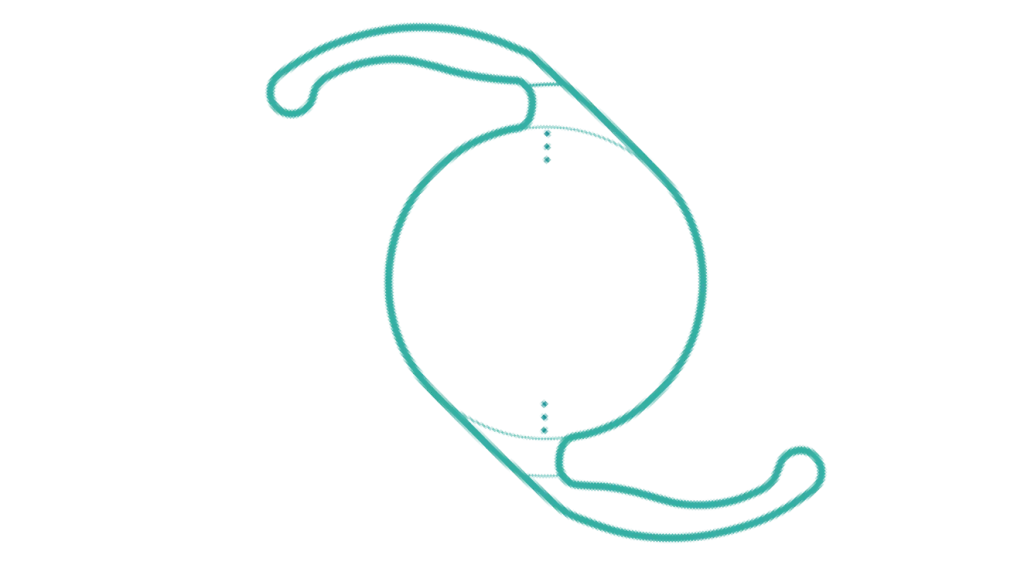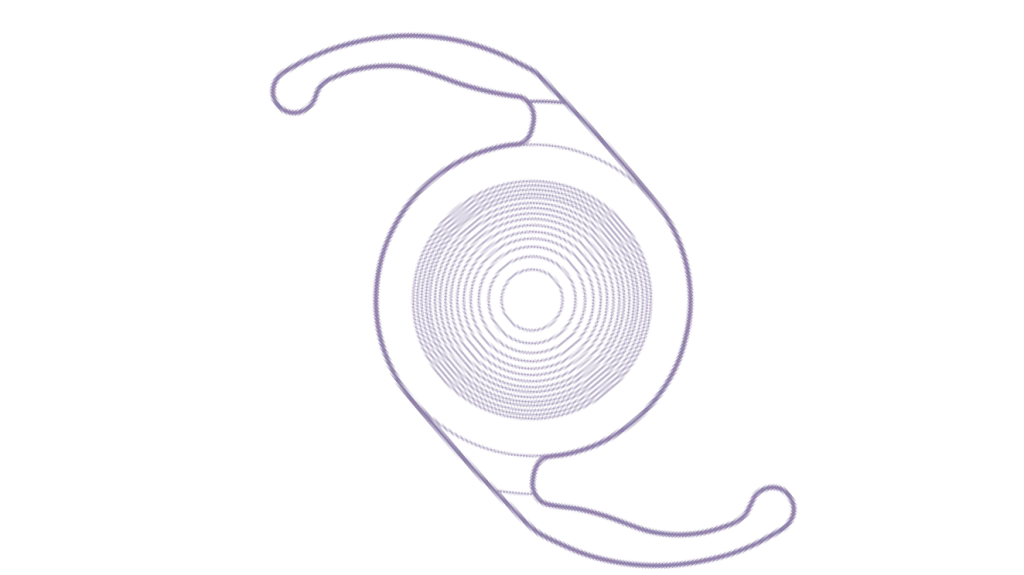Do you or someone you know have cataracts and require cataract surgery? Cataracts are a very common condition, particularly among older adults. However, treatment options for cataracts can be very different depending on an individual’s situation. While mild cataracts might require no more than a new eyeglasses prescription, advanced cataracts often require surgery.
Our ability to see is one of life’s most precious gifts. Imagine what it would be like if we had to live in total darkness. Many of us are blessed with good vision. As we age, a number of us begin to develop problems with our eyes. This is especially true of the elderly. In many cases, the cause of the poor vision is a cataract. However, with today’s technology, a cataract is easily treated with over 98% success rate.
What is a cataract?
When the lens on your eye is not completely crystal clear or becomes cloudy, this is known as a cataract. Like a camera, our eye uses film to take a picture and a lens to focus the picture. The film is actually the nerve of your eye, the lens just like that of a camera.
In a normal eye, the lens is clear, allowing light to pass through and focus on the retina. In a cataract eye, the lens becomes cloudy, obstructing the passage of light and resulting in blurred vision. Sources and related content
- Clear Lens: Light passes through the clear lens, focusing on the retina.
- Sharp Vision: The retina receives clear images, allowing for sharp vision.

- Cloudy Lens: A cloudy lens blocks or scatters light, reducing the amount of light that reaches the retina.
- Blurred Vision: The retina receives blurred images, leading to blurry vision.
What are the symptoms of cataract?
- Decreased vision without pain.
- Increased glare in sunlight or at night.
- A sensation of having a film over the eyes.
Are you at risk of developing cataracts?
Everyone develops cataracts. Cataracts are most predominant among people over the age of 50. People who are diabetic or have taken steroid medicines are prone to cataracts. Healthy people under 50 can also develop cataracts. Previous trauma or surgery to the eye can cause cataracts to mature sooner.
Cataract Surgery
How are cataracts treated?
There are no eye drops or medications to treat cataracts. Some claim that use eye drops and medications can reverse cataracts, but they are not effective. Eyeglasses may be helpful in the early stages of cataracts, but cataracts continues to progress and worsen.
The only effective treatment is a quick, painless surgical procedure. The surgery is performed in outpatient surgery centers. Permanently replacing the cataracts, the lens causes no irritation and never has to be taken out.
What method does Dr. Shepps use?
Dr. Shepps has performed over 20,000 successful cataract operations. He uses the advanced, widely popular Femtosecond Laser-assisted Phacoemulsification no-stitches technique (aka FLACS). Under topical and local anesthesia, the cataract is removed and an artificial lens implant is then inserted in its place.
With Dr. Shepps’s experienced surgeon’s hands, the entire procedure can take only 5-10 minutes.
Who needs surgery?
If your vision is impaired to the extent you no longer see normally, and when you cannot see well doing things such as driving, reading, watching movies, consider surgery. It may be dangerous if you wait until your vision is completely blurred. Delaying further complicates the surgery.
What are after effects of the cataract surgery?
Once a cataract is removed, it never grows back. After surgery, patients may experience: mild discomfort, foreign body sensation, blurred vision, light sensitivity, and inflammation or redness in the eye. As soon as the eye has healed, some patients may need reading glasses, others a thin pair of distance glasses. Some patients can see very clearly a day to a week after surgery. Others take several weeks. Patients can begin seeing with the operated eye the day after the surgery. There are minimal restrictions on activity after the surgery. No special diet is required.
Lens Implant Choices
You will be provided with options for different types of lens implants (IOLs, intraocular lens) to replace the cataract lens, which serves to improve your vision and retain the integrity of the surrounding structures.
- Standard Monofocal Lenses – a simple standard lens focused on one particular distance of clarity. This distance can be set for far, intermediate (computer), or near (reading).
- Monovision – a vision correction technique that involves implanting a different IOL in each eye during cataract surgery, one IOL set for distance vision and the other for near vision. This allows the brain to adapt to using one eye for distance vision and the other for near vision, reducing the reliance on glasses to see a range of distance after surgery. Usually, this technique is first simulated in the office using contact lenses or glasses, or the candidate already possesses and is comfortable with monovision.
- Astigmatism-correction Lens (Toric® IOL) – corrects astigmatism through monofocal or multifocal lenses. These are not suitable for patients with: pre-existing posterior segment pathology, zonular instability, and irregular astigmatism
- Multifocal IOLs – a sophisticated lens that adds range and depth of focus after cataract surgery, reducing the need for progressive or reading glasses.




Check out https://smarteducator.myalcon.com for a simulated experience.
KEY TAKEAWAYS
To help decide which lens options fits you best, keep these questions in mind as a guide during your consultation and preop:
- What activities and range of vision do you enjoy most? (ie outdoor, reading, day-trading, etc.)
- What do you do most without glasses?
- Do you mind or want to wear glasses or contact lenses after cataract surgery?
- Can you tolerate having different focuses in each eye?
- What is your tolerance to vision aberrations, such as nighttime glares and halos?
Your Partner in Clear Vision
Cataract surgery is not to be taken lightly. Detailed testing is necessary to determine whether or not you are a good candidate for the surgery.
At Associate Ophthalmologists, we have over 30 years of experience in cataract surgery. Our expert team, led by highly skilled and experienced surgeon, Dr. Gerald Shepps, has helped thousands of patients achieve clear vision freedom. We are committed to providing detailed testing and personalized consultations to ensure you choose the best vision correction option for your needs.
Ready to See the Difference? Schedule Your Consultation Today!
Contact Associate Ophthalmologists today to schedule a consultation. We offer comprehensive consultations and advanced technology to ensure optimal outcomes. Take the first step towards a world of vibrant, clear vision – contact us today!